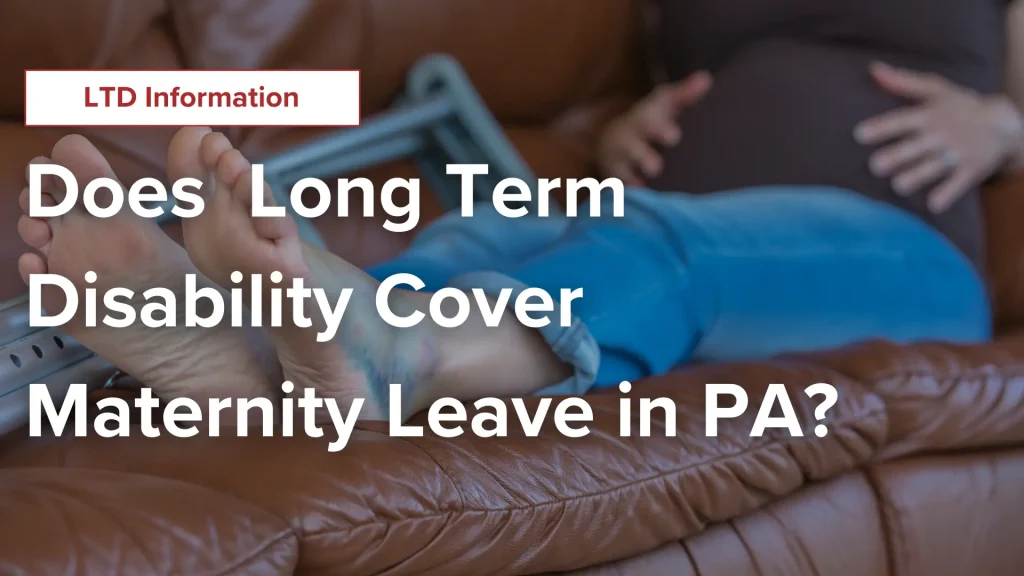Posted on Thursday, August 1st, 2024 at 9:00 am

When expecting a child, many soon-to-be parents in Pennsylvania wonder about their financial options during maternity leave. One question often arises: “Does long-term disability insurance cover maternity leave?” The short answer is that while long-term disability (LTD) typically doesn’t cover routine maternity leave, it may provide benefits in certain pregnancy-related circumstances.
Understanding Long-Term Disability Insurance
Long-term disability insurance is designed to replace a portion of your income if you’re unable to work due to a serious illness or injury. Unlike short-term disability, which often does cover normal pregnancy and childbirth, LTD policies generally don’t cover routine maternity leave.
However, LTD may come into play if pregnancy-related complications result in an extended inability to work.
When Might LTD Cover Pregnancy-Related Conditions?
While a typical pregnancy and childbirth won’t trigger long-term disability insurance benefits, certain complications might. These could include:
- Severe pregnancy-related conditions: Illnesses like preeclampsia, gestational diabetes, or hyperemesis gravidarum that require extended bed rest or hospitalization.
- Childbirth complications: Cesarean section recovery that extends beyond the typical recovery period or is complicated by severe postpartum hemorrhage.
- Postpartum mental health issues: Severe postpartum depression or postpartum psychosis that prevents return to work.
- Other medical conditions exacerbated by pregnancy: Pre-existing conditions like multiple sclerosis or heart conditions that worsen due to pregnancy.
These conditions must typically extend beyond the elimination period specified in your policy, which is often 90 to 180 days, for them to make you eligible for LTD benefits.
Critical Considerations for Pennsylvania Residents
If you’re a Pennsylvania resident who is considering relying on LTD for pregnancy-related conditions, keep these points in mind:
- Policy specifics: Review your policy carefully. Some LTD policies explicitly exclude pregnancy-related conditions, while others may cover them under certain circumstances.
- Elimination period: Understand your policy’s elimination period. This is the time you must be disabled before benefits begin, typically ranging from 90 to 180 days.
- Definition of disability: Your policy’s definition of disability is crucial. Some policies only provide benefits if you can’t perform your specific job, while others require you to be unable to perform any job.
- Pre-existing conditions: If you were pregnant before your LTD coverage began, it might be considered a pre-existing condition and excluded from coverage.
- Benefit period: If you qualify for LTD due to pregnancy complications, understand how long benefits will last. Some policies have specific limits for certain conditions.
Alternative Options for Maternity Leave in Pennsylvania
Given that LTD rarely covers routine maternity leave, it’s important to explore other options:
- Short-Term Disability Benefits: Many employers offer short-term disability insurance, typically covering normal pregnancy and childbirth for six to eight weeks. This short-term disability coverage can provide essential financial assistance during a crucial time for new parents.
- Family and Medical Leave Act (FMLA): While this federal law doesn’t provide paid leave, FMLA does protect your job for up to 12 weeks if you take leave for childbirth.
- Pennsylvania Pregnancy Workers Fairness Act: This law requires employers to provide reasonable accommodations for pregnant employees, which could include modified duties or leave.
- Employer-specific policies: Some Pennsylvania employers offer paid maternity leave as part of their benefits package.
- Savings: Planning ahead and saving for maternity leave can provide a financial cushion.
Why It’s Important to Understand Your Coverage

Dealing with disability insurance and maternity leave policies can be complex. Understanding your specific policy and its application to pregnancy and childbirth is crucial. Here are some steps you can take:
- Review your policy: Carefully read your LTD policy, paying special attention to any clauses related to pregnancy or childbirth.
- Consult with HR: Your company’s human resources department can provide information about your disability coverage and other maternity leave options.
- Speak with your healthcare provider: Discuss any potential pregnancy complications that could lead to extended disability.
- Consider legal advice: If you’re facing a complex situation or a claim denial, consulting an experienced disability insurance attorney can be invaluable.
Discuss Your Case with a Trusted Disability Lawyer from Capitan Law
While long-term disability insurance typically doesn’t cover routine maternity leave in Pennsylvania, it may provide crucial financial support in cases of severe pregnancy complications or related health issues. Understanding your policy, knowing your rights, and planning ahead is key to ensuring you have appropriate coverage and support during this important time in your life.
If you’re facing challenges with a long-term disability claim related to pregnancy or any other condition, don’t hesitate to seek professional legal advice from our Philadelphia long-term disability insurance attorneys. At Capitan Law, we focus our practice on helping individuals with their disability insurance claims. Contact us online or call us today at (267) 419-7888 for a free consultation to discuss your situation and how we can help protect your rights and secure the benefits you deserve.
Related Posts:
Can You Collect Workers Comp and Long Term Disability at the Same Time?
What Is an Employee Welfare Plan Exempt From ERISA Regulations?
How Do I Know If I Have an ERISA Plan or Non-ERISA Plan?